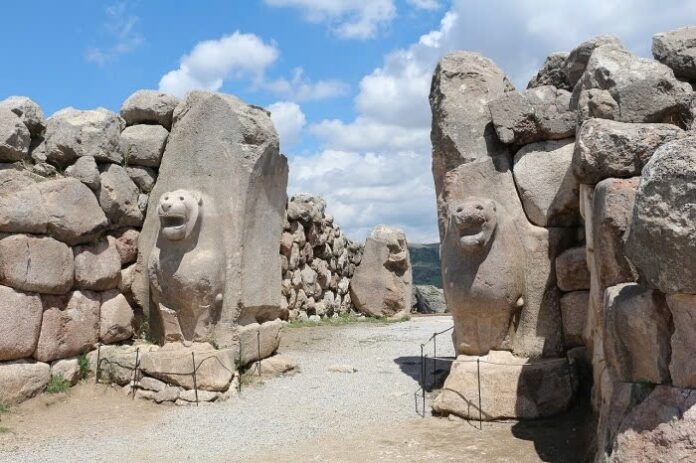A Sacred Site Carved in Stone

Nestled among rocky outcrops near the ancient Hittite capital of Hattusha lies Yazılıkaya, one of the most remarkable religious shrines of the Hittite Empire. This open-air sanctuary, whose name means “inscribed rock” in Turkish, offers a fascinating glimpse into the spiritual world of an ancient civilization that once dominated much of Anatolia.
The Divine Procession

As worshippers entered Yazılıkaya, they were greeted by an awe-inspiring sight: walls adorned with intricate bas-reliefs depicting a grand procession of Hittite deities. Gods and goddesses, their heads crowned with pointed caps or elaborate tiaras, marched in two long lines converging at the center. Here, the mighty weather god Teshub, revered as the “King of Heaven, Lord of The Land of the Hatti,” faced his divine consort.
A Pantheon Revealed

While many of the figures remain unidentified, archaeologists have recognized several key deities:
- Sharruma, son of the great gods, leading the procession of goddesses
- Shaushga, the Hittite version of Venus, marching with the male gods
- Telipinu, patron god of vegetation, holding symbols of abundance
- The Moon god, a rare identifiable figure among the winged deities
Intriguingly, the hieroglyphic inscriptions accompanying these gods bear Hurrian names, reflecting the complex cultural influences that shaped Hittite religion.
A Royal Legacy

The creation of Yazılıkaya is closely tied to the Hittite royal family. King Hattushili III and his son Tudhaliya IV commissioned the carving of these magnificent sculptures in the 13th century BCE. Queen Puduhepa, a priestess from the Hurrian province of Kizzuwatna, played a crucial role in bringing new religious traditions to the Hittite court.
Celebrating the Cosmic Order

Yazılıkaya served as more than just a beautiful monument. Ancient texts suggest it was the site of a great festival celebrating the union of Heaven and Earth at the New Year. This springtime celebration, possibly coinciding with the vernal equinox, reaffirmed the cosmic order and the Hittite king’s divine right to rule.
A Window to the Past

Today, Yazılıkaya stands as a testament to the artistic and spiritual achievements of the Hittite civilization. Its weathered yet still impressive reliefs continue to captivate visitors, offering a unique window into the religious beliefs and royal power of this ancient Anatolian empire.

